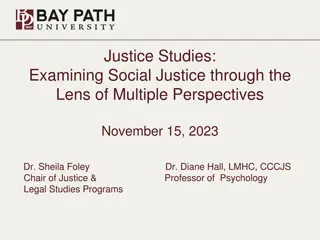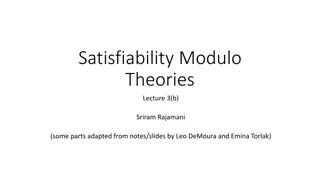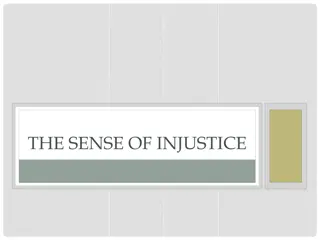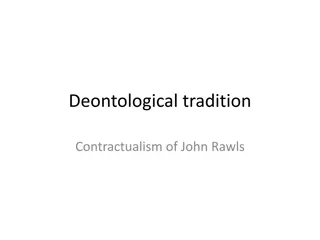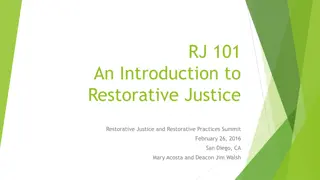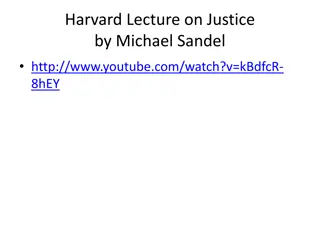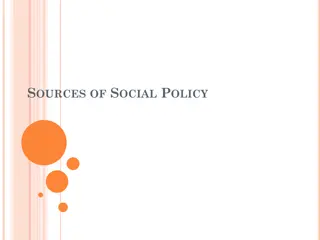Theories of Justice and Rawls' Principles Explained
Explore various theories of justice including comprehensive, principle-based, and contextual approaches, along with types of justice such as procedural and distributive. Delve into Rawls' social contract and principles of justice focusing on fairness and equality. Discover how Rawls envisions a just state and the principles he advocates for achieving a fair society.
Download Presentation

Please find below an Image/Link to download the presentation.
The content on the website is provided AS IS for your information and personal use only. It may not be sold, licensed, or shared on other websites without obtaining consent from the author. Download presentation by click this link. If you encounter any issues during the download, it is possible that the publisher has removed the file from their server.
E N D
Presentation Transcript
SOME THEORIES OF JUSTICE Comprehensive/ Principle Based Contextual/ Casuistical Utilitarianism Michael Walzer John Rawls Communitarians Robert Nozick
TYPES OF JUSTICE Procedural justice Level playing field Equality before the law Due process Distributive justice Equal opportunity Desert Outcome based versions (patterned principles) Historical theories Rights theories Compensatory justice Retributive justice Transitional justice
RAWLSS SOCIAL CONTRACT Links up moral choice (consent) and rational choice: the original position and the veil of ignorance as a way to avoid the principles of justice being infected by self-interest Hypothetical contract that identifies the most basic principles of justice Such a contractarian approach could also be (and has been) used to justify utilitarianism
RAWLS ON THE JUST STATE Justice as fairness A just society is one run on just principles A just society would be a fair society Fairness involves Distributive Justice There is a fair distribution of primary social goods wealth, opportunities, liberties and privileges, bases of self respect (e.g. equality of political representation)
RAWLSS PRINCIPLES OF JUSTICE Each person is to have an equal right to the most extensive total system of equal basic liberties compatible with a similar system of liberty for all Social and economic inequalities are to be arranged so that they are both: (a) to the greatest benefit of the least advantaged (the difference principle) and (b) attached to offices and positions open to all under conditions of fair equality of opportunity The lexical ordering of the principles (the priority of liberty) Utilitarianism, Rawls s principles, egalitariansim Desert: defined by the principles of justice
RAWLS ON THE JUST STATE What is a Fair Society? Would a fair society would be one that any rational, self-interested person would want to join? Not quite. They will be biased to their own talents.
RAWLS ON THE JUST STATE The Veil of Ignorance Suppose they chose from behind a Veil of Ignorance where they didn t know what their talents were or where they would be placed in society? They would choose a society that would be fair to all because they d have to live with their choice So, a fair society is one that any rational, self- interested person behind the veil of ignorance would want to join
RAWLS ON THE JUST STATE The Original Position How would we choose? We are choosing fundamental social conditions determining our life prospects We get to choose just once We would follow a maximin choice principle choose the setup in which your worst outcome is better than your worst outcome in any other setup We wouldn t give up fundamental rights and liberties
RAWLS ON THE JUST STATE The Original Position Rawls is a Social Contract Theorist In forming a social contract we decide upon the basic structure of society We do so as self-interested and rational choosers, from behind the veil of ignorance This choice position Rawls calls The Original Position
CRITIQUES OF SOCIAL CONTRACT THEORIES Communitarianism: the State s authority does not depend on the consent of individuals; rather, individuals depend on the State for their fulfillment and identity (Aristotle, Hegel) Feminism: because women typically are expected to focus on private (family) matters, they are excluded from full participation in the social contract Susan Okin
MINIMAL STATE (ENTITLEMENT) THEORY: ROBERT NOZICK We are entitled to use our property as we see fit. The State s legitimate power is limited to preventing harm and protecting property rights Taxation for anything other than protection (e.g, to impose a pattern to redistribute wealth) is unjust because it ignores how goods are acquired fairly through trade, labor, gifts, etc.
NOZICKS ENTITLEMENT THEORY NOZICK S ENTITLEMENT THEORY Libertarian approach to justice Libertarian approach to justice Based on a Lockean conception of property Based on a Lockean conception of property
3 PRINCIPLES 3 PRINCIPLES Principle of Transfer Principle of Transfer whatever is justly acquired whatever is justly acquired can be freely transferred. can be freely transferred. Principle of Just Initial Acquisition Principle of Just Initial Acquisition an account of how people come initially to own the things that how people come initially to own the things that can be transferred in accordance with principle (1) can be transferred in accordance with principle (1) Principle of Rectification of Injustice Principle of Rectification of Injustice how to deal with holdings if they were unjustly acquired or with holdings if they were unjustly acquired or transferred. transferred. an account of how to deal
HISTORICAL VS. END HISTORICAL VS. END- -RESULT PRINCIPLES RESULT PRINCIPLES Historical Principles: distributive principles Historical Principles: distributive principles that depends upon how a distribution came that depends upon how a distribution came about. about. Current Time Current Time- -Slice Principles (End Slice Principles (End- -Result Principles): justice of a distribution is Principles): justice of a distribution is determined by how things are distributed, determined by how things are distributed, based on based on structural principles structural principles. . Entitlement Theory results in a Entitlement Theory results in a non patterned distribution. patterned distribution. Result non- -
AMBITION VS. ENDOWMENT AMBITION VS. ENDOWMENT Unlike Rawls s theory, Nozick s theory is not Unlike Rawls s theory, Nozick s theory is not endowment endowment- -sensitive but is ambition sensitive but is ambition- - sensitive sensitive According to Nozick, only the minimalist state is According to Nozick, only the minimalist state is the only morally justified state the only morally justified state Enforcement of contracts Enforcement of contracts Protection against force and fraud Protection against force and fraud
INTUITIVE ARGUMENT FOR THE ENTITLEMENT INTUITIVE ARGUMENT FOR THE ENTITLEMENT THEORY THEORY D1: Just distribution of goods is provided by D1: Just distribution of goods is provided by some rule R1 some rule R1 D2: State which results from the movement D2: State which results from the movement from D1 according to principle(s) P. from D1 according to principle(s) P. If D1 is a just distribution, and the exchange of If D1 is a just distribution, and the exchange of goods that results in D2 is not forced, then D2 goods that results in D2 is not forced, then D2 is just. is just.
AMARTYA SEN: DEVELOPMENT AS FREEDOM What ought to be distributed are: 1. Elementary functions: doings and beings such as having access to adequate food and shelter that can be secured by personal liberty, income, and wealth. 2. Complex functions: doings and beings such as having self-respect and being able to take part in political communities that depend on factors independent of possessing resources.
MARTHA NUSSBAUM: CAPABILITIES APPROACH Central human functional capabilities that ought to be distributed: 1. Life 2. Bodily health 3. Bodily integrity 4. Senses, imagination, and thought 5. Emotions 6. Practical reason 7. Affiliation toward other species and as the basis for self-respect and dignity 8. Other species 9. Play 10. Control over your political and material environment
SENS AND NUSSBAUMS CAPABILITIES APPROACHES For Sen, a person who cannot exercise elementary and complex functions falls short of living a decent human life; for Nussbaum, a person who lacks capabilities falls short of living a decent life. Political and economic institutions ought to facilitate and/or provide opportunities for people to exercise functions (Sen) or capabilities (Nussbaum).
SCOPE, SHAPE, AND CURRENCY OF CAPABILITIES APPROACHES Scope: Minimally these approaches cover all people. Shape: Capabilities approaches are based on hybrids of equality and sufficiency. Currency: Capabilities approaches distribute opportunities to exercise what it fundamentally means to be human (central functions or capabilities).
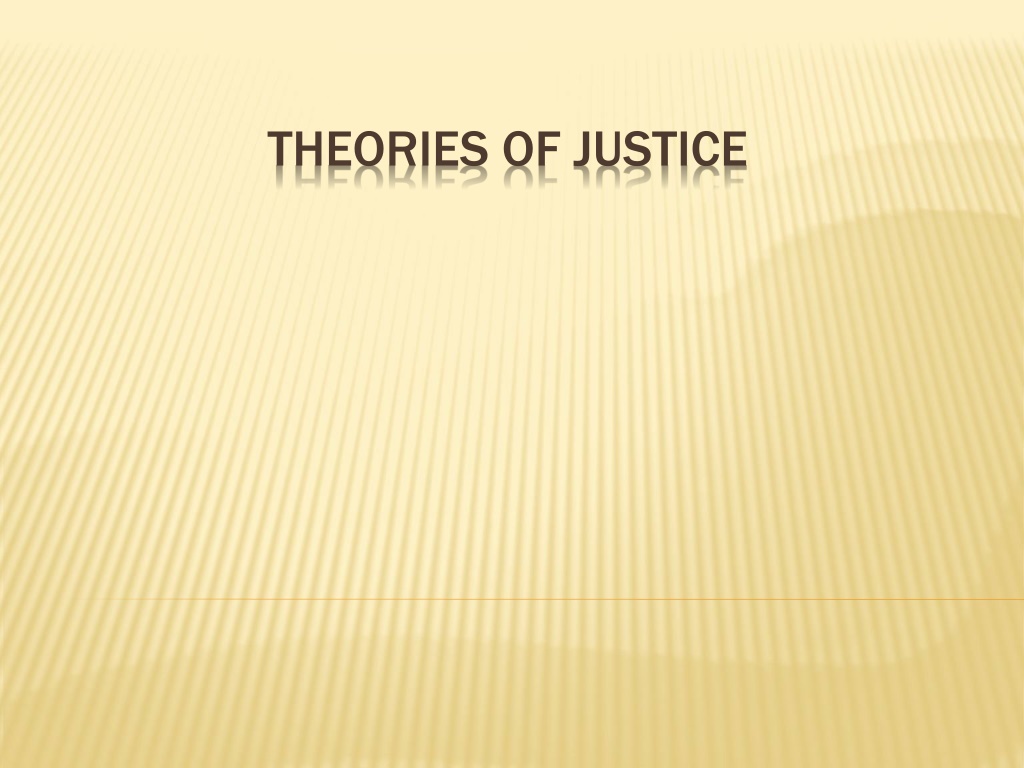
 undefined
undefined












